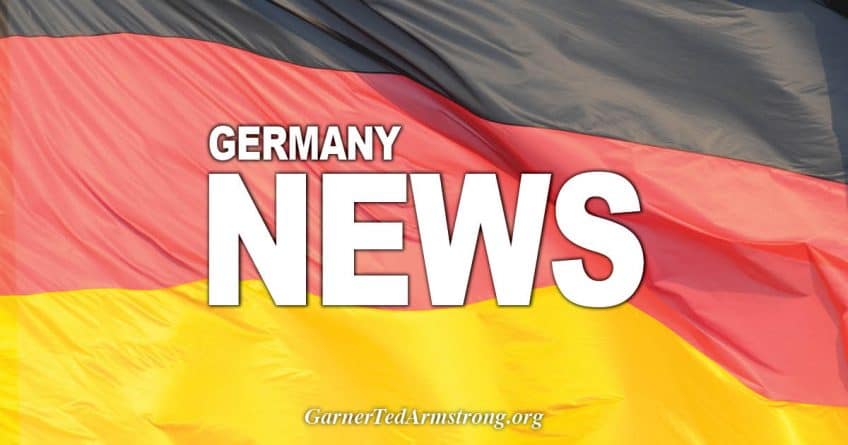Does Auschwitz require Germans to protect Jews from Muslims, or all minorities including Muslims from everybody? A country ill at ease with its past faces a dilemma it wasn’t ready for.
 Source: Christoph Schmid
Source: Christoph Schmid
One of the world’s most fraught relationship triangles is the one connecting Germans, Jews, and Muslims. Suspended over that triangle is of course the Holocaust. For seven decades, post-war Germans thought they understood their unique burden and responsibility. It was and is to atone for Auschwitz by taking it as a mandate to be and to do good — at home and abroad, today and tomorrow.
But the passage of time has a funny way of confusing old certitudes. One question that was never clarified — because it never needed to be asked — is whether German atonement should be particular or universal.
The particularist conclusion says that Germans must never again harm Jews. They must protect their former victims wherever they can, on the streets of Berlin or Tel Aviv, at the United Nations or on the Golan Heights.
The universalist lesson is general: Germans must never again discriminate against any minority — white, brown or purple; Jewish, Muslim, or Wiccan; Western, Eastern or exotic. And Germany, which once not only murdered millions but also turned millions more into refugees, must be a haven to those human beings who legitimately deserve refuge today.
For decades, there was no conflict between the particularist and the universalist responses to the German past. Germany has stood by Israel more reliably than any other country in the EU. Germans have also become the world’s most avid commemorators. They memorialize the Holocaust in their cities, on their buildings, on their streets. (The form I find most moving is Stolpersteine, the little brass “stumbling stones” that I described here.)
At the same time, Germany for a long time pretended that other minorities pose no major dilemma. Muslims started coming to Germany in large numbers in the 1960s, mainly as Turkish “guest workers”. They have kept coming ever since, from various countries. (In the Neukölln borough of Berlin, the latest buzz is about Syrians driving out Turks.) Today about 5 million Muslims live in Germany.
And yet Muslims were never accepted as “belonging to” or “being part of” Germany. When a former German president used that exact phrase in 2010, a controversy erupted that still rages, and even strains the current governing coalition.
But then there was the autumn of 2015. Nobody who was in Germany during that refugee crisis will ever forget the experience. Many Germans in late summer of that year got goosebumps as they saw on the TV news — and pay attention to the iconography — crowds of dark-skinned men, women and children in tattered clothes, camped on the platform of an eastern-European train station (in Budapest) where they were trapped, waiting for … trains.

The trains they were waiting for promised to take the huddled masses not east but west, not toward death but toward liberty and safety, in a land called Germany. “Germany, Germany,” the wretched masses were chanting, right through the cameras and into German living rooms. Victims of war atrocities were using the English name of the country that had once run trains from the same place toward the camps. Now the name meant salvation. History appeared to have symmetry. Germany was good at last.
Out poured emotions that had been bottled up for decades. As the refugees disembarked from their trains in September 2015 — in Munich, the site of Hitler’s failed putsch of 1923 and the unofficial Nazi capital — Germans were lining the exits and streets. Entire families had turned out. They bore teddy bears, candy, bottled water. Above all, they bore smiles. All across the country, Germans volunteered — their money, clothes and time — to help the refugees.
But historical narratives are clean in a way that real life is not. A few months later, on New Year’s Eve 2015, hordes of young Muslim men in Cologne assaulted, molested and violated scores of German women who had turned out for the fireworks. Most of the men were neither refugees nor Syrians, but economic migrants from northern Africa. But the distinctions were lost in the outrage that followed.
Out poured countervailing emotions, also bottled up for a long time: Fears of “the other”, of alien men bringing misogyny or even terror. And also bringing hatred of Jews.
To say that all or even most Muslims hate Jews is untrue and grossly unjust, just as it was to tar all Germans as anti-Semitic in the 1930s. But to pretend that hatred of Jews does not run like a deep current through Muslim culture today as it ran through German culture then is panglossian, naive, delusional — and probably just disingenuous. Just visit a few schoolyards in Berlin, where the children of Muslims use “Jew” as a catch-all slur and harass the children of Jews.
And there it is: The universalist German responsibility (don’t stereotype minorities like Muslims) has slammed right into the particularist duty (protect Jews). And the “Germans”, from teachers and deans to parents and politicians, have frozen up, like deer in headlights. Some can’t even bring themselves to admit the distinction — on the playground, Muslim, Jew and gentile alike are probably German citizens.
In that helplessness, mainstream Germans resemble people everywhere who genuinely try to do right in a world that just isn’t. And they prove, yet again, what Karl Popper called “the paradox of tolerance”, that bane of liberal progressives in particular. If society values tolerance above all, Popper observed, it will eventually be destroyed by the intolerant. The only answer, he thought, is to be resolutely intolerant of intolerance.
A first step is for Germans to find words for their dilemma. In so doing they must steer between the Scylla of anti-Muslim populism and the Charybdis of politically correct waffle. It may take new and fresh faces to do so.
Perhaps a young, female, Muslim face such as Sawsan Chebli’s. Today, she is an up-and-coming politician in Berlin. But she was born in Germany as a stateless daughter of Palestinian refugees. She is German and Islamic, part of the majority and the minority, a former refuge seeker who is now among the refuge givers. The other day, she suggested that asylum seekers trying to integrate into German society should, like Germans, be required to to go on field trips to former concentration camps. Among native-born Germans her idea proved controversial. It shouldn’t be.
Andreas Kluth is editor-in-chief of Handelsblatt Global. You can reach him at a.kluth@handelsblattgroup.com
Source: https://global.handelsblatt.com/opinion/germans-jews-muslims-and-the-paradox-of-tolerance-908064
[Disclaimer]









